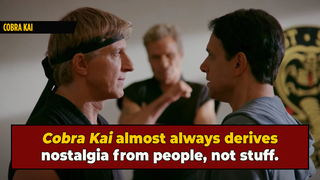Why The Nostalgia Of 'Cobra Kai' Actually Works

This article contains SPOILERS for Cobra Kai Season Three.
One of the most popular streaming TV shows right now is Cobra Kai, which, if you haven't seen it, is best described as a steamy soap opera but with Karate instead of sex. According to Netflix, Cobra Kai has been watched by a whopping 41 million households -- a testament to both how beloved the original Karate Kid movie is and also how goddamn bored everyone is right now. But Cobra Kai really is a great show and stands (in a Crane Kick position) apart from so many other nostalgia-fueled retreads. Of course, the series is positively brimming with Karate Kid nostalgia, but it never feels like a shallow cash-grab. Why? Because its nostalgia is almost always derived from people, not stuff.
Don't Miss
So often, belated sequels tether their sentimentality to iconic junk; the Millennium Falcon in The Force Awakens, the abandoned Overlook Hotel in Doctor Sleep and Jurassic World finds its young heroes discovering the remnants of the original Discovery Center, in a scene so panderingly nostalgic they may as well have stumbled upon a VHS copy of Jurassic Park next to a McDonald's Dino-Sized collector's cup.
Sure, there are familiar trinkets in Cobra Kai, such as Mr. Miyagi's old car, but they're ornamental at best. No character invests any exaggerated emotional attachment to these random thingamajigs because the audience has a pre-existing affection towards them. One of the best examples of this is in the episode in which Daniel travels back to Mr. Miyagi's village, where he spent the bulk of The Karate Kid Part II, only to discover that it's been turned into an outdoor shopping mall.
Daniel's nostalgia-driven soul searching led him to a friggin' Red Lobster. But his journey is salvaged when he meets his old teen love interest, Kumiko. The show illustrates that the past is not a place you can tangibly go back to because the world is constantly changing. Human relationships, on the other hand, are the most (and perhaps the only) meaningful manifestation of nostalgia. Similarly, one of the most impactful moments in the series is the reappearance of Elizabeth Shue as Ali, whose adolescent '80s charms are what sowed the central conflict between Daniel LaRusso and Johnny Lawrence in the first place. And it's her adult perspective that paves the way for their reconciliation.
But if human beings are the most vital way to commune with the past, Cobra Kai shows us how that can be a double-edged sword. At the beginning of the series, Johnny tries to engage with his own superficial nostalgia by reopening the Cobra Kai dojo of his youth. Of course, Cobra Kai isn't inherently evil, but Johnny's decision inadvertently conjures the villainous John Kreese back into his life. Ultimately it's people, not labels or iconography, that matter. What makes Cobra Kai great is how it continually reinforces that theme even when other long-running franchises repeatedly make the opposite argument.
You (yes, you) should follow JM on Twitter! And check out the podcast Rewatchability.
Top Image: Netflix